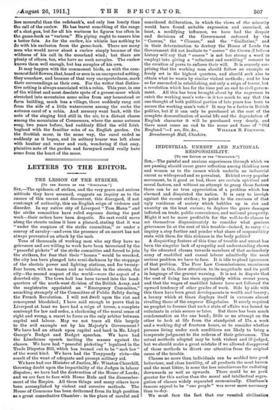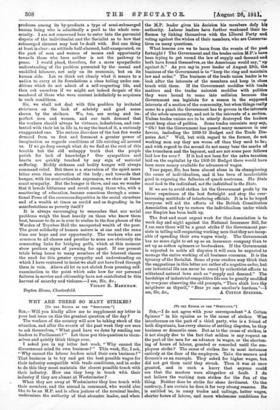INDUSTRIAL UNREST AND NATIONAL RESPONSIBILITY.
[To THR EDITOR OF THE " SPECTATOR.") Sin,—The painful and anxious experiences through which we are passing should cause grave reflection among thinking men and women as to the causes which underlie an industrial unrest so widespread and so prevalent. Behind every popular movement, be it good or bad, there are certain spiritual and moral factors, and without an attempt to grasp those factors there can be no true appreciation of a problem which has alarmed and disquieted the nation. It is easy to inveigh against the recent strikes ; to point to the excesses of that ugly residuum of society which bubbles up in riot and anarchy on the least excuse; to deplore the grave damages inflicted on trade, public convenience, and national prosperity. Might it not be more profitable for the well-to-do classes to set themselves dispassionately to consider what geniune grievances lie at the root of this trouble—indeed, to carry tl e inquiry a step further and ponder what share of responsibility rests with them for this sickness in the body politic?
A disquieting feature of this time of trouble and unrest has
been the singular lack of sympathy and understanding shown by the educated classes towards members of that melancholy army of unskilled and casual labour admittedly the most serious problem we have to face. It is idle to plead ignorance of that problem. The Poor Law Commissioners, unanimous at least in this, drew attention to its magnitude and its peril in language of the gravest warning. It is not in dispute that the cost of living has risen appreciably within recent years, and that the wages of unskilled labour have not followed the upward tendency of other grades of work. Side by side with this there have been great developments in wealth and luxury ; a luxury which at times displays itself in excesses almost rivalling those of the emperor Elagabalus. It surely required no prophet to foresee that such a state of affairs was bound to culminate in crisis sooner or later. But there has been much condemnation on the one hand ; little or no attempt on the other to look at life from the standpoint of 17s. a week and a working day of fourteen hours, or to consider whether persons living under such conditions are likely to bring a temperate judgment to the redress of their grievances. The actual methods adopted may be both violent and ill-judged, but we should make a great mistake if we allowed disapproval of those methods to divert our attention from the original cause of the trouble.
Classes no more than individuals can be scolded into good behaviour, and class hostility, of all products the most barren and the most bitter, is none the leas mischievous for radiating downwards as well as upwards. There could be no peril greater for this nation than the moral and intellectual segre- gation of classes widely separated economically. Chatham's famous appeal to be " one people" was never more necessary than to-day.
We must face the fact that our vaunted civilization
produces among its by-products a type of semi-submerged human being who is admittedly a peril to the whole com- munity. I am not concerned here to enter into the perennial dispute of the individualist and the Socialist as to how that submerged element may best be dealt with. But one thing at least is clear : an attitude half-alarmed, half-exasperated, on the part of men and women of means and opportunity towards those who have neither is not the pathway to peace. I would plead, therefore, for a more sympathetic understanding of the problem presented by the casual and unskilled labourer, not only on its economic, but on its human side. Let us think out clearly what it means to a nation to carry at its foundations a class toiling under con- ditions which do not admit of a sell-respecting life, and then ask ourselves if we might not indeed despair of the manhood of those who were content indefinitely to acquiesce in such conditions.
Sir, we shall not deal with this problem by irritated strictures on the lack of sobriety and good sense shown by the strikers. We, too, are erring and im- perfect men and women, and our tacit demand that the workers should always be virtuous, industrious, and con- tented with their lot in life is, to say the least of it, a curiously exaggerated one. The serious disorders of the last few weeks demand from us first and foremost a greater power of imagination as regards conditions of life existing all around us. If we go deep enough what do we find at the root of this trouble but the old unhappy truth that the people perish for lack of knowledge P Our sympathies and hearts are quickly touched by any sign of material suffering. Bodily sickness and bodily hunger will always command relief. But there is a starvation of the spirit more bitter even than starvation of the body ; and towards that hunger, with its semi-articulate expression, we show at times scant sympathy. But the hunger is there, and can we wonder that it breeds bitterness and revolt among those who, with a smattering of education, become conscious through a sensa- tional Press of the enormous disparities in the social structure and of a wealth at times as sordid and as degrading in its manifestations as poverty itself P It is always encouraging to remember that our social problems weigh the least heavily on those who know them best, because to do so is ever to realize in the fine phrase of the Warden of Toynbee Hall the unexpected wealth of the poor. The great solidarity of human nature is at one and the same time our hope and our opportunity. The workers who are common to all classes and peculiar to none are obviously the connecting links for bridging gulfs, which at this moment show perilous signs of yawning far apart. If our present trials bring home to many members of the leisured classes the need for this greater sympathy and understanding on which I have ventured to insist we shall not have lived through them in vain. Above all let us not shrink from pressing self- examination to the point which asks how far our personal failures in service and citizenship have not contributed to this harvest of anarchy and violence.—I am, Sir, &e., Topton House, Chesterfield. VIOLET R. MA_REHAM.



































 Previous page
Previous page